- Home
- Gustave Flaubert
Memoirs of a Madman and November Page 3
Memoirs of a Madman and November Read online
Page 3
Oh, how long it lasted, that thought! Like a hydra it devoured me with all its many mouths.
The thought of loss and bitterness, the thought of a weeping jester, the thought of a meditating philosopher…
Oh yes, how many hours have slipped by in my life, long and monotonous, as I thought and doubted! How many winter days have I spent with my head lowered, in front of the fire’s embers whitened by the pale reflection of the setting sun; how many summer evenings out in the fields at dusk watching the clouds fleeing and unfurling, the wheat fields waving in the breeze, hearing the woods rustling and listening to nature sighing at night.
Oh, how dreamy was my childhood, what a poor madman I was, without fixed ideas, without positive opinions! I would watch the water flow between the clumps of trees dangling their leaves like a head of hair and dropping their blossom; I would contemplate from my cradle the moon shining in the dark-blue sky lighting up my bedroom and drawing strange shapes on the walls; I would fall into ecstasy at the sight of beautiful sunlight or a spring morning with its white mist, its blossoming trees, its daisies in flower.
I also liked, and this is one of my tenderest and most delightful memories, to watch the sea, the waves foaming over each other, the swell breaking into spray, sweeping right across the beach and crying aloud as it withdrew over the pebbles and seashells.
I would run from rock to rock, taking the sand of the ocean and letting it drift in the wind as it trickled through my fingers, I would splash the seaweed, I would breathe in deep that fresh salty ocean air that suffuses your soul with such energy, with poetic and far-reaching thoughts.
I would look out at the immensity, space, the infinite, and my soul was swallowed up before this limitless horizon.
Oh, but that is not where the limitless horizon really is! The vast abyss. Oh no, a wider and deeper abyss opened up before me. That abyss is untroubled by any storm: if it could be stormy, it would be full – and it is empty!
I was cheerful and happy, loving life and my mother, poor mother!
I still remember my little joys as I watched the horses racing down the road, saw the smoke of their breath and the sweat soaking their harnesses, I loved their monotonous and rhythmic trot, jogging the main braces; and then when we stopped – all was quiet in the fields. You could see the smoke billowing from their nostrils, the carriage rocked and then settled back on its springs, the wind blew against the windows, and that was all…
Oh, how wide I opened my eyes too at the sight of the crowd in holiday clothes, merry, with its tumultuous cries, a stormy sea of men, even more bad-tempered than the tempest and more stupid than its fury.
I loved chariots horses armies uniforms of war the beat of the drums, the noise the gunpowder and the cannons rolling over the cobbled streets of the towns.
As a child I loved what can be seen, as a teenager what can be felt, as a man I no longer love anything. And yet how many things I have in my soul, how much inner strength and how many oceans of anger and love crash together and break in this heart so weak, so feeble so fallen so weary so exhausted!
I am told I should once more get a life, mix with the crowd!… But how can the broken branch bear fruit, how can the leaf torn away by the winds and dragged through the dust grow green again? And why, so young, such bitterness? What do I know? It was perhaps my destiny to live like this, weary before having borne any burden, out of breath before having run…
I have read, I have worked, filled with the ardour of enthusiasm… I have written… Oh, how happy I was then, how high my thought in its delirium flew up into those regions unknown to man, where there is neither world nor planets nor suns! I had an infinity even more immense, if that is possible, than the infinity of God, in which poetry floated and stretched out its wings in an atmosphere of love and ecstasy, and then I had to descend from those sublime regions to words, and how can one translate into words that harmony which arises in the poet’s soul, and the giant thoughts which make the sentences bend and bow as a strong swollen hand splits open the glove wrapped round it?
There too lay disappointment, for we come back to earth, to that earth* of ice where all fire dies, where all energy drains away. By what rungs can one descend from the infinite to the positive? By what stages can thought lower itself without breaking apart? How can one cut down to size that giant who embraces the infinite?
Then I had moments of gloom and despondency, I felt my strength breaking me and that weakness I was ashamed of – for words are but the distant, muffled echo of thought. I cursed my dearest dreams and my silent hours spent on the limits of creation. I felt something empty and insatiable devouring me.
Tired of poetry, I launched myself into the field of meditation.
At first I fell in love with that imposing study which takes man as its subject and sets out to explain him, going so far as to dissect hypotheses and argue over the most abstract suppositions and to set out in geometrical style the emptiest of words.
Man, a grain of sand thrown into the infinite by an unknown hand, a poor insect with feeble little legs trying at the edge of the abyss to keep its grip on every branch, holding on tight to virtue, love, egoism, ambition, and turning all of these things into virtues so as better to hang on, clinging to God and yet still weakening, letting go and falling…
Man who wants to understand what is not, and develop a science of nothingness; man, a soul made in God’s image and whose sublime genius is arrested by a blade of grass and cannot overcome the problem of a speck of dust.
And weariness overcame me, I began to doubt everything. Though young I was old, my heart was wrinkled and seeing old men still full of life, of enthusiasm and beliefs, I would laugh bitterly at myself, so young, so disabused of life, of love, of fame, of God, of all that is, of all that can be. However, I was seized by a natural horror before embracing this faith in nothingness. At the edge of the abyss I closed my eyes – I fell in.
I was happy, I no longer had any farther to fall, I was cold and calm like a tombstone – I thought I could find happiness in doubt, crazy as I was! You spin through it as through an incommensurable void.
That void is immense and makes your hair stand up in horror when you draw near its edge.
From doubting God I finally came to doubting virtue, that fragile idea which each century has set up to the best of its ability on an even shakier scaffolding of laws.
I will tell you later all the phases of this gloomy and meditative life spent by the fireside with my arms folded, with an eternal yawn of boredom – alone for a whole day – and turning from time to time to look at the snow on the neighbouring rooftops, the sunset with its pale light spilling across the flagstones of my bedroom, or a yellow death’s head with its fixed toothless grimace on my mantelpiece, a symbol of life and, like life, cold and mocking.
Later on you will perhaps read all the anguishes of this heart so battered, so broken with bitterness. You will learn about the adventures of this life, so peaceful and so commonplace, so full of emotions, so empty of events.
And then you will tell me if it is not all derision and mockery, if everything sung in the schools, all the nonsense spun out in books, everything that can be seen felt and said, everything that exists…
I can’t finish, my bitterness is too great to express it – oh, if only all this were not in the end to be mere pity, smoke, nothingness!
3
I WENT TO SCHOOL AS SOON AS I WAS TEN, and there I developed early on a profound aversion for men – the society of children is as cruel towards its victims as that other little society – that of men.
The same injustice of the crowd, the same tyranny of prejudice and force, the same egoism, whatever has been said about the disinterestedness and loyalty of youth. Youth – the age of madness and dreams, of poetry and folly, those synonyms in the mouths of people who judge the world soundly. There I was rebuffed in all my tastes – in class for my ideas, during break for my tendencies towards a savage unsociability.
From
then on I was a madman.
So I lived there alone and bored, harassed by my masters and jeered at by my schoolmates. I had a mocking and independent temperament, and my biting and cynical irony was no more sparing of an individual whim than it was of the despotism of them all.
I can still see myself on the classroom benches, absorbed in my dreams of the future, thinking of the most sublime things which the imagination of a poet and a child can dream up, while the teacher made fun of my Latin verse, my schoolmates sniggered at me. The idiots, they laughing at me! When they were so feeble, so common, so narrow-minded – whereas I, whose spirit was immersed in the limits of creation, who was absorbed in all the worlds of poetry, I who felt myself to be greater than them all, was granted infinite pleasures and experienced heavenly raptures at all the intimate revelations of my soul.
I who felt myself as vast as the world and whom a single one of my thoughts, if it had been of fire like a bolt of lightning, could have reduced to dust. Poor madman!
I could see myself young, at twenty, wreathed in glory, I would dream of long voyages into the countries of the south, I could see the Orient and its vast sands, its palaces roamed through by camels with little bronze bells, I could see mares dashing off towards the horizon bathed in red sunlight, I could see blue waves, a pure sky, silver sand, I could smell the fragrance of those warm oceans of the south, and then near me, beneath a tent in the shade of a broad-leaved aloe tree, a woman with brown skin and an ardent gaze, who enfolded me in her arms and spoke to me in the language of houris.*
The sun was sinking into the sand, the she-camels and the mares were asleep, insects buzzed round their dugs, the evening breeze blew close by – and when night had fallen, when that silver moon gazed palely down onto the desert, and the stars shone out in that dark-blue sky, then in the silence of that warm and fragrant night, I would dream of infinite joys, and pleasures which are those of heaven.
And then again it was fame with its applause, its fanfares rising skywards, its laurel wreaths, its gold dust strewn in the winds – it was a brilliant theatre with women in all their finery, diamonds with all their glitter, a heavy atmosphere, panting bosoms – then a religious sense of absorption, words as all-devouring as a fire, tears, laughter, sobs, the intoxication of fame – exclamations of enthusiasm, the crowd stamping its approval. What! Vanity, noise, nothingness.
As a child I dreamt of love – as a young man of fame – as a man, of the tomb, that last love of those who have no love left.
I could also descry the ancient period of vanished centuries and of races laid to rest under the grass, I could see the band of pilgrims and warriors marching towards Calvary, stopping in the desert, dying of starvation, imploring the same God they were on their way to seek, and weary of their blasphemies continuing to march towards that endless horizon – then, exhausted, panting, finally reaching their journey’s end, despairing and aged, to embrace a few arid stones, paid homage by the whole world; I could see iron-clad knights riding on iron-clad horses, and lances clashing in the tournaments, and the drawbridge being lowered to receive the suzerain returning with his sword running red and captives on the crupper of his horses; or at night in the dark cathedral, the whole nave adorned with a garland of nations rising up towards the vault in the galleries, with songs, lights glowing resplendent on the stained-glass windows and, on the night of Christmas, the old city with its pointed snow-covered rooftops, all lit up and singing.
But it was Rome I loved – imperial Rome, that beautiful queen wallowing in orgies, spattering her noble robes with the wine of debauchery, prouder of her vices than she was of her virtues. Nero – Nero with his diamond chariots flying into the arena, his thousand carriages, his tigerish loves and his giant feasts. Far from lessons in the classics I would take myself back to your immense pleasures, your blood-drenched illuminations, your amusements that set Rome on fire.
And lulled by these vague reveries, these hazy dreams of the future, carried away by that venturesome imagination roaming like an unbridled mare fording torrents, galloping up mountain sides and flying off into space – I would spend hours at a time with my head in my hands gazing at the floor of my study or at a spider weaving its web on our master’s lectern – and when I came to, dazed and wide-eyed, they all laughed at me – the laziest boy in the class, who would never have a single positive idea, who showed no inclination for any profession, who would be useless in this world where everyone has to go off and get their share of the cake, and who would ultimately never be good for anything, at best merely a jester, a keeper of fairground animals, or a maker of books.
(Although in excellent health, my type of mind, permanently set on edge by the life I was leading and by contact with others, had caused me to develop a nervous irritability which made me abrasive and quick-tempered like the bull driven mad by insect stings. I had dreams, dreadful nightmares.)
Oh, a sad and cheerless time! I can still myself wandering alone down the long whitewashed corridors of my school, looking, looking at the owls and the crows taking flight from the gables of the chapel; or else, in bed in those gloomy dormitories lit by the lamp in which the oil froze at night, I would listen for hours to the wind blowing lugubriously in the long empty apartments and whistling through the keyholes as it rattled the windows in their frames, I could hear the footsteps of the nightwatchman slowly doing his rounds with his lantern, and when he came close to me I pretended to be asleep, and I would indeed doze off, half in dreams and half in tears.
4
THEY WERE FEARFUL VISIONS, enough to drive you mad with terror.
I was in bed in my father’s house, all the furniture had been preserved, and yet everything surrounding me had a black hue; it was a winter night and the snow was shedding a white gleam into my bedroom – suddenly the snow melted and the trees and the grass took on a reddish-brown, burnt tint, as if a fire had been casting its glow on my windows. I could hear footsteps – someone was coming upstairs – a warm gust of air, a fetid vapour rose up to me – my door opened by itself. They came in, there were a lot of them – perhaps seven or eight, I didn’t have the time to count them. They were short or tall, black-bearded ruffians – without weapons, but all with a steel blade between their teeth and, as they encircled my cradle, their teeth started chattering and it was horrible; they drew aside my white curtains and every finger left a streak of blood; they gazed at me with great, staring lidless eyes. I gazed at them too – I couldn’t move a muscle – I wanted to scream.
It seemed to me then that the house was rising up out of its foundations, as if prised up by a lever.
They gazed at me like this for quite a while, then they withdrew and I saw that all of them had one side of their faces flayed and slowly bleeding.
They lifted up all of my clothes and they were all bloodstained. They began to eat and the bread they broke oozed blood which fell drop by drop; and they started to laugh, like the death rattle of a dying man.
Then when they were no longer there, everything they had touched – the panelling, the staircase, the ceiling – was all stained blood-red by them.
I had a taste of bitterness in my heart. I felt as if I had eaten flesh. And I heard a prolonged, raucous, sharp cry, and the windows and doors slowly swung open, and the wind made them slam and creak, like a strange song whose every shrill note drove a dagger through my breast.
Another time there was verdant countryside scattered with flowers along a river; I was with my mother who was walking near the riverbank – she fell. I saw the water foaming, the ripples widening and suddenly disappearing. The stream resumed its course, and then all I could hear was the sound of the water flowing between the rushes and bending the reeds.
All at once my mother called me: “Help, help! oh my poor child, help me, help me!”
I flattened myself in the grass, leaning down to look, but I could see nothing; the cries continued.
An invincible force was holding me fast – to the firm ground – and I could hear th
e cries: “I’m drowning, I’m drowning, help me!”
The water flowed on, flowed limpidly on, and that voice I could hear from the depths of the river plunged me into despair and rage…
5
THAT, THEN, IS WHAT I WAS LIKE – a carefree dreamer with an independent and mocking temperament, building up a destiny for myself and dreaming of all the poetry of a life filled with love – and living on my memories, insofar as one can have many memories at sixteen.
I strongly disliked school. It would be an interesting subject to study, this profound disgust felt by noble and elevated souls, showing itself the minute they come into irksome contact with men. I have never liked a regular life, fixed hours, an existence ruled by the clock in which thought has to stop as soon as the bell rings, in which everything is wound up in advance for centuries and generations. This regularity may doubtless suit the majority, but for the poor child who draws nourishment from poetry, from dreams and fantasies, who thinks of love and every kind of nonsense, it means ceaselessly waking him out of this sublime dream, it means not leaving him a moment’s peace, it means stifling him by dragging him back into our atmosphere of materialism and common sense, which inspire him with horror and disgust.
I would go off by myself with a book of verse, a novel – poetry, something to bring a thrill to the heart of a young man with as yet no experience of sensations and so desirous of gaining some.
I recall with what intense pleasure I devoured, at that time, the pages of Byron, and of Werther, with what transports I read Hamlet, Romeo, and the most ardent productions of our age, all those works, in a word, that make the soul melt with rapture or set it aflame with enthusiasm.*

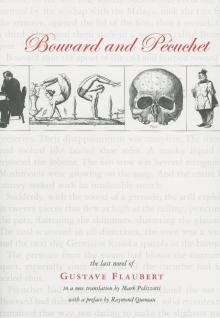 Bouvard and Pecuchet
Bouvard and Pecuchet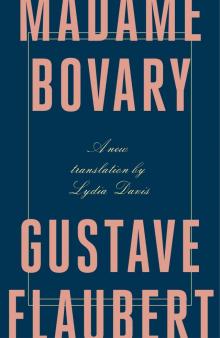 Madame Bovary
Madame Bovary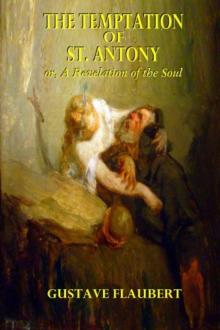 The Temptation of St. Antony
The Temptation of St. Antony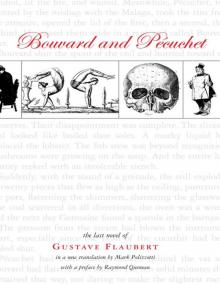 Bouvard and Pécuchet: A Tragi-comic Novel of Bourgeois Life, part 1
Bouvard and Pécuchet: A Tragi-comic Novel of Bourgeois Life, part 1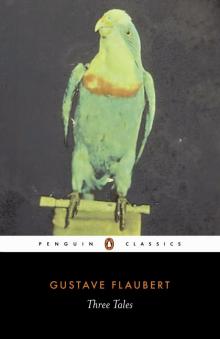 Three Tales
Three Tales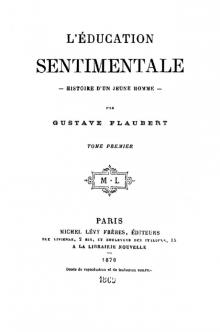 Education sentimentale. English
Education sentimentale. English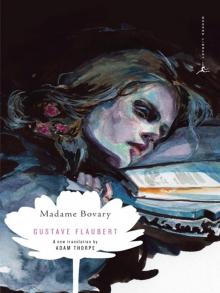 Madame Bovary (Modern Library)
Madame Bovary (Modern Library)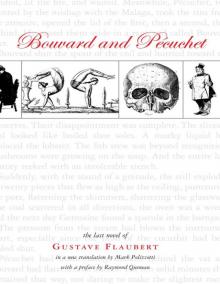 Bouvard and Pécuchet: A Tragi-comic Novel of Bourgeois Life, part 2
Bouvard and Pécuchet: A Tragi-comic Novel of Bourgeois Life, part 2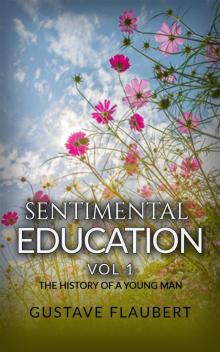 Sentimental Education; Or, The History of a Young Man. Volume 1
Sentimental Education; Or, The History of a Young Man. Volume 1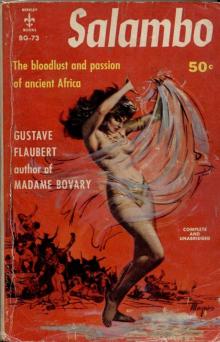 Salammbo
Salammbo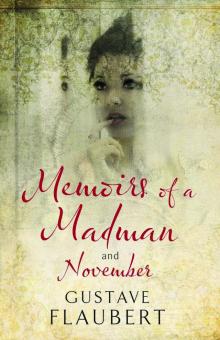 Memoirs of a Madman and November
Memoirs of a Madman and November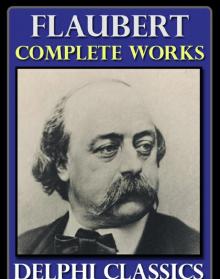 Complete Works of Gustave Flaubert
Complete Works of Gustave Flaubert